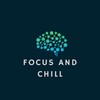

Focus and Chill - productivity tactics for AuDHDers and other neurodivergent folks
Jeremy Nagel and Joey K
Welcome to the Focus and Chill podcast where we discuss productivity tactics that work for AuDHDers and other neurospicy people.
Every episode we interview guests with lived experience of neurodivergence who also have a solid productivity and habit game and pass the learnings on to you, our wise and benevolent audience.
Podcast sponsored by https://focusbear.io
Every episode we interview guests with lived experience of neurodivergence who also have a solid productivity and habit game and pass the learnings on to you, our wise and benevolent audience.
Podcast sponsored by https://focusbear.io
Episodes
Mentioned books
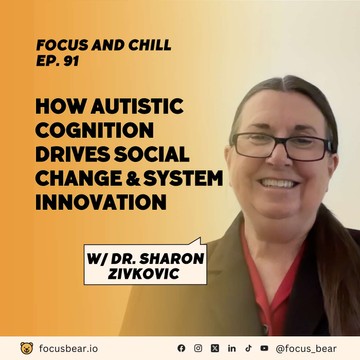
Feb 22, 2025 • 43min
Episode 91: Dr. Sharon Zivkovic
Welcome to episode #91! We’re thrilled to be joined by Dr. Sharon Zivkovic today.Dr. Sharon Zivkovic is an autistic social entrepreneur, systems thinker, and complexity scientist. As the CEO of Community Capacity Builders, she has used autistic cognition and systemizing strengths to develop and commercialize innovative solutions for wicked problems.Sharon has been recognized with a Fresh Scientist Award and her work is featured on the Complexity Sciences Map for Applied Complexity. Most recently, she founded the Centre for Autistic Social Entrepreneurship, which aims to create a neurodiversity-affirming entrepreneurial ecosystem.In this episode, we discuss how autistic cognition can be a superpower in systems thinking, innovation, and entrepreneurship.Welcome to the show, Sharon!QuestionsJN: When did you first realize you were neurodivergent?Knew she was different as a child but autism wasn’t associated with girls at the timeStruggled in school due to difficulty processing informationWas eventually signed out of school at 14 and spent 16 years on welfareJN: What led you back to education later in life?Wanted to be financially independent when her daughter turned 16Went back to high school as the only mature-age student, then pursued university degreesDeveloped self-learning strategies, including recording lectures and transcribing them at homeJN: What was your career path before entrepreneurship?Worked in accounting and economic development, but struggled with traditional employmentWas successful in jobs but found she was “uncontrollable” as an employeeEventually started Community Capacity Builders to work on her own termsJC: What inspired you to become a social entrepreneur?Developed social innovation programs focused on community capacity buildingWon the Enterprising Woman of the Year Award for her work in social enterpriseStarted seeing autistic cognition as an advantage in problem-solving and system innovationJC: What is a "wicked problem" and how does complexity science help solve them?Wicked problems are complex issues like climate change & poverty with no simple solutionsComplexity science helps map out the interconnected causes and effectsUses system transitions and structured problem-solving to drive changeJN: How did receiving an autism diagnosis at 61 impact you?Helped her understand why traditional employment never workedRealized she had built the perfect life for an autistic person—self-employed, off-grid, full control over workFrustrated by the deficit-based approach of disability servicesJN: What challenges do autistic entrepreneurs face?Rigid business structures don’t work for many autistic thinkersStruggle with delegation, executive function, and bureaucracyNeed support systems tailored to their cognitive strengthsJC: What productivity strategies work best for you?Works in long focus blocks, starting immediately after waking upMonotropic focus—prefers to work on one major project at a timeTakes structured movement breaks throughout the dayJC: What strategies do NOT work for you?Multitasking or switching between different projects—prefers to finish one before starting anotherTraditional productivity hacks designed for neurotypicalsRigid, unnecessary social obligations—prioritizes meaningful work over networkingJN: What does your morning routine look like?Straight to work after waking up—no coffee, no distractionsWorks for several hours before breakfastHighly structured and optimized for deep workJN: How do you wind down at night?Watches movies while doing physiotherapy exercisesBatch cooks meals to minimize time spent on daily food prepLoves her off-grid lifestyle and avoids unnecessary social interactionsJN: Where can people connect with you?LinkedIn: linkedin.com/in/dr-sharon-zivkovic-2587888Website: https://www.communitycapacity.com.au/JC: Final words for the audience?“Neurodiversity is a movement. We need to take control of our own narrative.”“Autistic cognition is an asset—let’s build systems that recognize and support it.”More from Focus Bear:Website: https://focusbear.ioLinkedIn: https://www.linkedin.com/company/focus-bear/Youtube: https://www.youtube.com/@focusbearappTwitter: https://twitter.com/focusbear1Instagram: https://www.instagram.com/focus_bear/Facebook: https://www.facebook.com/focusbearapp/Podcast: https://podcast.focusbear.ioTiktok: https://www.tiktok.com/@focusbearConnect with Jeremy:LinkedIn: https://linkedin.com/in/nageljeremyEmail: jeremy@focusbear.ioConnect with Joey:LinkedIn: https://www.linkedin.com/in/joeycorea/Newsletter: https://thepluckyjester.com/newsletter/
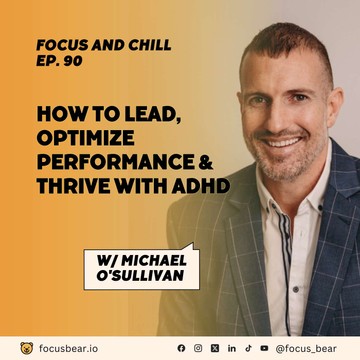
Feb 22, 2025 • 47min
Episode 90: Michael O’Sullivan
Welcome to episode #90! We’re thrilled to be joined by Michael O’Sullivan today.Michael O’Sullivan is a mind and body performance coach specializing in executive health, leadership, and peak performance. With over 25 years of experience in health and well-being, he helps CEOs, entrepreneurs, and professionals optimize their energy, focus, and productivity.As the founder of Body Beyond Limits and Elite Power Moves, Michael works with functional genomic testing, blood work, and high-performance strategies to create personalized health and leadership plans. Diagnosed with ADHD later in life, he has turned it into a superpower, designing science-backed methods to manage stress, master time, and maintain momentum.In this episode, we discuss ADHD, leadership, energy management, and how to structure your life for long-term success.Welcome to the show, Michael!QuestionsJN: When did you first realize you were neurodivergent?Always struggled with focus, impulsivity, and delegationFriends with ADHD pointed out he had all the traitsGot diagnosed at age 40 and turned ADHD into a strengthJN: How did ADHD affect your leadership style?Used to be a transactional leader, constantly checking on tasksTransitioned to transformational leadership using the 10-80-10 approachLearned to delegate, trust his team, and focus on high-impact workJN: What changes did you make in managing your business and team?Uses Loom videos, SOPs, and AI to streamline workGives his team more ownership and accountabilityFocuses on high-leverage tasks rather than micromanagingJC: What are some of your best productivity strategies for ADHD?Time-blocking energy levels – Grouping similar tasks togetherRecording Loom videos & delegating – Saves time on repetitive tasksUsing binaural beats & movement breaks – Boosts focus & creativityJC: What are some productivity strategies that DON’T work for you?Pomodoro technique – Finds longer deep-work sessions more effectiveStrict to-do lists – Prefers prioritizing tasks based on impact & energyForcing structure – Works better with flexible routines & flow statesJN: What does your morning routine look like?Wakes up at 3 AM – Starts the day with lemon water & breathworkGratitude journaling & movement – Sets the tone for peak performanceDeep work first – Tackles the most important tasks before distractionsJN: How do you wind down at night?Stops eating 2 hours before bed – Optimizes digestion & sleep qualityBlue light blockers & meditation – Reduces mental overstimulationAsks subconscious questions before sleep – Enhances problem-solving overnightJN: How does diet impact ADHD & performance?Avoids high-starch meals that spike insulin – Keeps blood sugar stableFocuses on high-protein, nutrient-dense meals for sustained energyUses scheduled meal reminders to avoid forgetting to eatJN: How do movement and recovery affect productivity?6 minutes of movement every hour boosts productivity by 60%Uses cryotherapy, hot yoga & gym sessions to regulate stressSchedules recovery days after high-energy work periodsJN: Where can people connect with you?LinkedIn: https://www.linkedin.com/in/elitepowermoves/Instagram: https://www.instagram.com/michaelosullivanexecutivecoach/Website: https://www.michaelosullivanfitness.com/official-pageJC: Final words for the audience?"Success isn’t about working harder—it’s about managing energy smarter.""Optimize your calendar, focus on high-impact work, and make recovery a priority."More from Focus Bear:Website: https://focusbear.ioLinkedIn: https://www.linkedin.com/company/focus-bear/Youtube: https://www.youtube.com/@focusbearappTwitter: https://twitter.com/focusbear1Instagram: https://www.instagram.com/focus_bear/Facebook: https://www.facebook.com/focusbearapp/Podcast: https://podcast.focusbear.ioTiktok: https://www.tiktok.com/@focusbearConnect with Jeremy:LinkedIn: https://linkedin.com/in/nageljeremyEmail: jeremy@focusbear.ioConnect with Joey:LinkedIn: https://www.linkedin.com/in/joeycorea/Newsletter: https://thepluckyjester.com/newsletter/
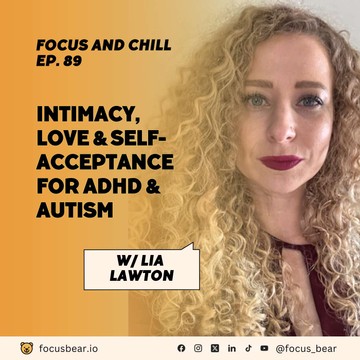
Feb 22, 2025 • 30min
Episode 89: Lia Lawton
Welcome to episode #89! We’re thrilled to be joined by Lia Lawton today.Lia Lawton is a neurodivergent psychologist and psychosexual therapist, passionate about helping clients explore intimacy, communication, and relationships in ways that are authentic to their unique neurotypes. She runs Fine Sanctuary, a private practice that provides therapy for ADHD, autism, and sexual health concerns.Diagnosed with ADHD in her late 20s, Lia understands firsthand the challenges of masking, late diagnosis, and navigating relationships as a neurodivergent adult. She is also working on developing neurodivergent-friendly tech tools to support better communication and connection.In this episode, we dive into how ADHD and autism affect relationships, intimacy, emotional regulation, and self-acceptance.Welcome to the show, Lia!QuestionsJN: When did you first realize you were neurodivergent?Late 20s—her dad was diagnosed first and encouraged her to get assessedHad struggled with dyscalculia (number dyslexia) in school but wasn’t identified as neurodivergentADHD traits were dismissed in school as “lazy” or “talking too much”JN: What was school like for you growing up?Thrived in primary school but struggled after transitioning to a larger, all-girls schoolWas misunderstood and labeled as lazy, leading to complete withdrawalA teacher once wrote in a report: "Lia handed in no work this year. Good luck for year 11."JN: What was your career path before psychology?Worked in event management, nightclubs, and the strip club industryLoved fast-paced, high-stimulation environments that suited her ADHD brainA bad therapy experience led her to return to university to study psychologyJC: How did getting diagnosed with ADHD change things for you?Medication was life-changing, but not a complete fixHelped level the playing field but still required additional strategiesFound alternative supports like binaural beats and heavy metal music for focusJC: How do ADHD and autism impact relationships and intimacy?Emotional regulation issues can cause communication breakdownsMasking in relationships leads to burnout and resentmentMany neurodivergent people struggle with sensory sensitivities & intimacy disconnectJC: What are some common intimacy struggles for neurodivergent clients?Porn addiction, anxiety around sex, erectile dysfunction, painful sex, and mismatched libidosRelationship challenges when one partner is neurodivergent and the other isn’tCommunication breakdowns due to different processing stylesJN: How do you help couples navigate neurodivergence in relationships?Explains the brain differences to both partners to build understandingHelps clients develop clearer communication strategiesEncourages acceptance of different intimacy needs rather than forcing a "norm"JN: What new projects are you working on?Exploring AI and app development to create neurodivergent-friendly communication toolsWriting a book on ADHD, sex, and relationships (currently in the idea-collection phase)JC: What productivity strategies work for you?Standing desk for movement while workingBinaural beats & heavy metal music to help with focusBreaking tasks into structured steps to avoid feeling overwhelmedJC: What productivity advice does NOT work for you?Journaling in pre-dated diaries—leads to guilt when she forgets to use it"Just remember to do it" strategies—doesn’t work for ADHD brainsOut of sight, out of mind—has to leave things visible to remember themJN: What does your morning routine look like?Not a morning person—needs time to wake up and resetStarts with a shower & reviewing client notes before first sessionUses movement & structured quiet time before diving into workJN: How do you wind down at night?Reads before bed to slow down thoughtsAvoids work-related conversations in the bedroomFinds her Golden Retriever comforting & part of her nightly routineJN: Where can people connect with you?Website: https://findsanctuary.com.au/Instagram: https://www.instagram.com/masterofsex_ology/JC: Final words for the audience?"Know your own brain. The more you understand it, the easier life becomes.""You’re already playing life on hard mode—find what makes things easier."More from Focus Bear:Website: https://focusbear.ioLinkedIn: https://www.linkedin.com/company/focus-bear/Youtube: https://www.youtube.com/@focusbearappTwitter: https://twitter.com/focusbear1Instagram: https://www.instagram.com/focus_bear/Facebook: https://www.facebook.com/focusbearapp/Podcast: https://podcast.focusbear.ioTiktok: https://www.tiktok.com/@focusbearConnect with Jeremy:LinkedIn: https://linkedin.com/in/nageljeremyEmail: jeremy@focusbear.ioConnect with Joey:LinkedIn: https://www.linkedin.com/in/joeycorea/Newsletter: https://thepluckyjester.com/newsletter/
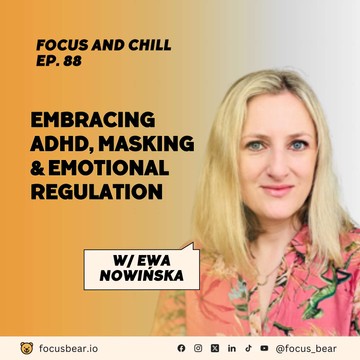
Feb 22, 2025 • 31min
Episode 88: Ewa Nowińska
Welcome to episode #88! We’re thrilled to be joined by Ewa Nowińska today.Ewa Nowińska is a psychologist specializing in ADHD, trauma, and eating disorders, with a unique perspective shaped by her lived experience in a neurodivergent family. Originally from Poland, she has lived and worked across four different countries and now practices in Sydney.Ewa's work focuses on helping adults with ADHD navigate emotional regulation, trauma healing, and eating disorders, using evidence-based methods like EMDR therapy. She also provides therapy in Spanish and Polish, making her practice accessible to diverse communities.In this episode, we explore the link between ADHD and trauma, masking, self-acceptance, and how to build emotional resilience.Welcome to the show, Ewa!QuestionsJN: When did you first realize you were neurodivergent?Grew up in a neurodivergent family but didn’t recognize her own ADHDHyperactivity and impulsivity were seen as personality traits rather than ADHD signsBegan working with ADHD assessments and recognized traits in herselfJN: What was it like growing up with undiagnosed ADHD?Encouraged to be creative at home, but criticized for being too loud & direct outsideCultural expectations in Poland added to the challenge of maskingRealized her traits stood out even among other Polish peopleJN: How did your ADHD diagnosis change things for you?Provided relief and clarity about why certain challenges existedExperienced the grief of late diagnosis, wondering how life might have been differentFaced dismissiveness from colleagues who viewed ADHD through a trauma-only lensJN: What’s the connection between ADHD and eating disorders?ADHDers often struggle with impulsivity, emotional eating & interoception (body signals)Hyperfixation on food or lack of structure can lead to disordered eating patternsEMDR therapy is useful for addressing past experiences tied to body image and food habitsJC: What are some of the biggest challenges your ADHD clients face?Rejection Sensitivity & Childhood Messages – internalizing being "too much"Masking & Burnout – trying to appear neurotypical leads to exhaustionBalancing Structure & Flexibility – learning how to create systems that workJC: What strategies help with emotional regulation?Body-based regulation – exercise, movement, and grounding techniquesExternalizing thoughts – writing down intrusive thoughts before bedCreating safe environments – surrounding yourself with people who accept you without maskingJN: How does EMDR therapy help neurodivergent individuals?Helps process past experiences of rejection, shame & traumaReduces emotional distress tied to past experiences of being misunderstoodProvides a non-verbal approach to processing trauma, which is useful for alexithymic (emotionally disconnected) individualsJN: What does your morning routine look like?6 AM wake-up – Prepares kids' lunches before heading to the gymGym session – Exercises in the morning as a non-negotiable self-care habitStarts work after breakfast with a structured but flexible approachJN: How do you wind down at night?Aiming for a 9 PM bedtime – Reads or watches something light before sleepingUses meditation & writing down thoughts if her mind is racingReminds herself that perfection isn’t necessary before going to sleepJN: Where can people connect with you?Website: https://enpsych.com.au/Instagram: https://www.instagram.com/enpsych.com.au/Ebook & Resources: Available on her websiteJC: Final words for the audience?"You don’t need to fit into neurotypical expectations—find what works for you.""Healing is possible when you allow yourself to be seen and understood.”More from Focus Bear:Website: https://focusbear.ioLinkedIn: https://www.linkedin.com/company/focus-bear/Youtube: https://www.youtube.com/@focusbearappTwitter: https://twitter.com/focusbear1Instagram: https://www.instagram.com/focus_bear/Facebook: https://www.facebook.com/focusbearapp/Podcast: https://podcast.focusbear.ioTiktok: https://www.tiktok.com/@focusbearConnect with Jeremy:LinkedIn: https://linkedin.com/in/nageljeremyEmail: jeremy@focusbear.ioConnect with Joey:LinkedIn: https://www.linkedin.com/in/joeycorea/Newsletter: https://thepluckyjester.com/newsletter/
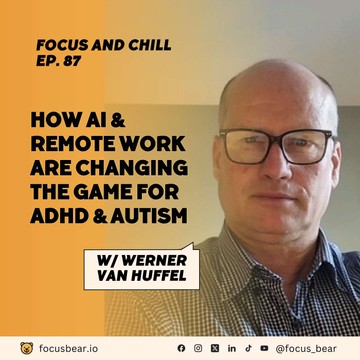
Feb 21, 2025 • 43min
Episode 87: Werner Van Huffel
Welcome to episode #87! We’re thrilled to be joined by Werner Van Huffel today.Werner Van Huffel is the co-founder of Kavn, a career support organization that helps neurodivergent professionals find meaningful remote work. With a background in enterprise architecture, AI, and business consulting, Werner has spent years advocating for career remoter professionals, ensuring they thrive in workspaces that align with their strengths.Diagnosed later in life, Werner discovered his neurodivergence through supporting his children. This realization led him to study psychology, homeschool his kids, and ultimately launch Kaven—a company that matches neurodivergent professionals with remote work environments that foster success.In this episode, we explore the intersection of neurodivergence, remote work, AI, and productivity.Welcome to the show, Werner!QuestionsJN: How did you first discover you were neurodivergent?Never thought of himself as different until seeing his children struggleStarted noticing similar traits in himself while homeschooling and studying psychologyRealized society has become less accepting of differences, which led to launching KavenJN: What inspired you to start Kaven?Started as a recruitment agency but quickly shifted focus to supporting neurodivergent professionalsNoticed a pattern: traditional career paths weren’t working for many neurodivergent peopleCoined the term “career remoter” to describe professionals who don’t follow linear career pathsJN: What is a "career remoter"?Someone who follows their own path rather than climbing a corporate ladderOften works independently, values flexibility, autonomy, and meaningful workMany neurodivergent professionals thrive in non-traditional career setupsJN: How does Kaven support remote professionals?Matches neurodivergent professionals with remote-friendly organizationsHelps businesses create truly inclusive remote work environmentsProvides psychological first aid & career coaching for professionals navigating career changesJN: What are the biggest advantages of remote work for neurodivergent individuals?Reduced social demands – Less energy spent on office politics and sensory overwhelmMore control over workspace – Can customize environment for focus and comfortFlexible schedules – Work when productivity is highest, not just 9 to 5JN: What are the challenges some neurodivergent professionals face with remote work?Some ADHD professionals struggle with lack of body doubling and external structureOthers miss spontaneous idea-sharing that happens in physical workspacesKaven helps find solutions tailored to individual needs, whether fully remote or hybridJC: How do you use AI as a productivity tool?Uses AI for speech-to-text to capture ideas faster than typingRuns AI-powered summarization tools to process large amounts of information quicklyBelieves AI is a game-changer for neurodivergent professionals who struggle with traditional workflowsJN: What productivity strategies work best for you?Focuses on outcomes rather than rigid to-do listsUses mind maps to organize thoughts and break down complex projectsRecords ideas verbally and transcribes them for structured reviewJN: What productivity advice doesn’t work for you?Strict time-blocking – Prefers a flexible workflow that allows for deep dives into tasks“Eat the frog” method – Finds it more effective to start with exciting tasks to build momentumTraditional task lists – Instead, prioritizes tasks based on impact & urgencyJN: What does your morning routine look like?Starts at 5 AM with a morning walk or exercise to get energy levels upPrepares mentally for the day by identifying key prioritiesWorks from home but visits client sites when needed for collaborationJN: How do you wind down at night?Gaming (Diablo, Project Zomboid, Elite Dangerous) helps transition from work to relaxationReads tech & psychology research to stay engaged with evolving ideasSometimes gets bursts of inspiration late at night and captures ideas before sleepingJN: Where can people connect with you?Website: https://www.kavn.au/Email: van@kavn.auJC: Final words for the audience?"Accept who you are. You’re not different—you’re you, and that’s enough.""Find the career setup that works for your brain, not the one society tells you to follow."More from Focus Bear:Website: https://focusbear.ioLinkedIn: https://www.linkedin.com/company/focus-bear/Youtube: https://www.youtube.com/@focusbearappTwitter: https://twitter.com/focusbear1Instagram: https://www.instagram.com/focus_bear/Facebook: https://www.facebook.com/focusbearapp/Podcast: https://podcast.focusbear.ioTiktok: https://www.tiktok.com/@focusbearConnect with Jeremy:LinkedIn: https://linkedin.com/in/nageljeremyEmail: jeremy@focusbear.ioConnect with Joey:LinkedIn: https://www.linkedin.com/in/joeycorea/Newsletter: https://thepluckyjester.com/newsletter/
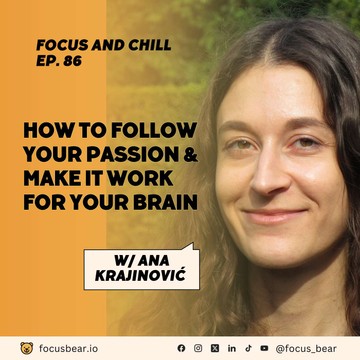
Feb 21, 2025 • 38min
Episode 86: Ana Krajinović
Welcome to episode #86! We’re thrilled to be joined by Ana Krajinović today.Ana Krajinović is a linguist, writer, and comic artist whose work explores the intersection of language, cognition, and visual storytelling. As an academic researcher at Tilburg University, she studies how comics use symbolic structures to convey meaning.Diagnosed with ADHD in adulthood, Ana has navigated challenges with task paralysis, executive dysfunction, and emotional regulation—but she’s also learned to harness her neurodivergence as a strength. Through her comics and writing, she shares insights on productivity, motivation, and embracing creative chaos.In this episode, we discuss ADHD, autism, creativity, productivity struggles, and how to work with your brain, not against it.Welcome to the show, Ana!QuestionsJN: When did you first realize you were neurodivergent?Started noticing ADHD traits about three years agoInitially misdiagnosed with depression and social anxietyDiscovered ADHD through HowToADHD YouTube videosDiagnosis process in Germany was smooth, but long-term care was challengingJN: What challenges did you face growing up with undiagnosed ADHD?Was an excellent student because school was a special interestSocial difficulties—never fully understood trends, popularity, or social normsStruggled with spatial awareness—difficulty with sports, movement, and even using appliancesNoticed task paralysis in adulthood when responsibilities increasedJN: How did your ADHD impact your PhD journey?Passion for linguistics kept her engaged, but executive function challenges made consistent work difficultStruggled with bureaucracy and non-research tasksMotivation fluctuated—hyperfocused on interesting topics but shut down on tedious tasksJN: How did you manage emotional regulation and overwhelm?Experienced meltdowns and shutdowns over small tasksLearned to recognize disproportionate emotional reactions to certain demandsFound self-acceptance through embracing chaos instead of forcing structureJC: What changed for you after receiving your ADHD diagnosis?Biggest shift was self-acceptance—realizing her brain works differently but isn’t "less"Stopped feeling guilty for needing more time on tasksMedication helped initially, but her biggest breakthrough came from Chasteberry supplementsFound a balance between structure and flexibility to optimize creativityJC: What are some productivity strategies that work for you?Start with tasks you enjoy to build momentumTrick yourself into hyperfocus by doing something exciting firstUse body doubling & external accountability to stay on trackFlexible scheduling—writes down tasks but doesn’t guilt-trip herself for postponing themJC: What productivity advice does NOT work for you?"Eat the frog" (doing the hardest task first)—kills motivation for the entire dayStrict time-blocking—leads to frustration when tasks take longer than expectedForcing inspiration—instead, she reads comics or listens to creators to spark ideasJN: How do you approach creativity and motivation?Embraces chaos—lets ideas flow rather than forcing a rigid scheduleUses deadlines as external motivators to push through creative blocksAllows herself to switch between projects instead of forcing consistencyJN: What does your morning routine look like?Slow start with breakfast & conversation—important for waking up mentallyGradual movement (yoga, stretching, light work) before diving into deep tasksAvoids immediate productivity pressure to prevent shutdownsJN: How do you wind down at night?Watches Netflix or does low-effort activities to relaxUses earplugs and a sleep mask to eliminate sensory disruptionsPrioritizes a quiet, distraction-free sleep environmentJN: Where can people connect with you?Website: annakrajinovic.comMedium: https://medium.com/@anakrajinovicSubstack: https://anakrajinovic.substack.com/Instagram: https://www.instagram.com/anacomics/JC: Final words for the audience?"Follow what excites you. If something doesn’t spark joy, explore a different path.""Don’t judge your productivity by neurotypical standards—find what works for your brain."More from Focus Bear:Website: https://focusbear.ioLinkedIn: https://www.linkedin.com/company/focus-bear/Youtube: https://www.youtube.com/@focusbearappTwitter: https://twitter.com/focusbear1Instagram: https://www.instagram.com/focus_bear/Facebook: https://www.facebook.com/focusbearapp/Podcast: https://podcast.focusbear.ioTiktok: https://www.tiktok.com/@focusbearConnect with Jeremy:LinkedIn: https://linkedin.com/in/nageljeremyEmail: jeremy@focusbear.ioConnect with Joey:LinkedIn: https://www.linkedin.com/in/joeycorea/Newsletter: https://thepluckyjester.com/newsletter/
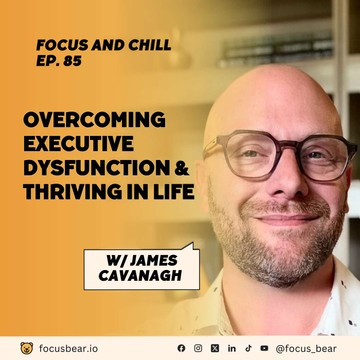
Feb 21, 2025 • 47min
Episode 85: James Cavanagh
Welcome to episode #85! We’re thrilled to be joined by James Cavanagh today.James Cavanagh is a neurodiversity consultant and the founder of Raw Life Health, a practice dedicated to helping neurodivergent individuals thrive. With over 25 years of experience in mental health, education, and disability support, James combines evidence-based therapy with lived experience to create neuroaffirming strategies.He is the creator of the Rawsome Framework, a strength-based approach to emotional regulation, productivity, and resilience. Passionate about transforming workplaces, healthcare, and education for neurodivergent individuals, James brings a holistic and person-centered approach to his work.In this episode, we discuss ADHD, emotional regulation, executive functioning, and how to create personalized routines that actually work.Welcome to the show, James!QuestionsJN: Can you share your journey with neurodivergence?Showed signs of ADHD in childhood but wasn’t diagnosed until later in lifeExperienced anxiety and misdiagnoses in the 90s before identifying as neurodivergentDiagnosis brought relief and a structured guide for self-understandingJN: What challenges did you face growing up with ADHD?Struggled with emotional regulation, leading to difficulties in social and work settingsFelt frustrated by the executive function demands of traditional education and workplacesRealized later in life that ADHD was impacting finances, relationships, and daily routinesJN: How has ADHD shaped your career path?Worked in various fields—education, mental health, disability support—before founding Raw Life HealthUsed his curiosity and adaptability as strengths rather than seeing them as failuresBuilt a strengths-based approach to help others find their personal work-life balanceJN: Can you explain the Rawsome Framework?A strengths-based system for resilience, emotional regulation, and productivityConsists of seven pillars: Relationships, Adaptability, Wellness, Sensory Processing, Organization, Mindfulness, and EmpowermentDesigned to help individuals create structured, flexible environments that work for their neurotypeJN: What are some key productivity strategies that work for ADHD?Uses the Mandatory, Mundane, Meaningful (3M) Method to structure daily tasksGamifies tasks to make boring activities more engagingUses stress as a currency—ensuring high-stress tasks provide meaningful outcomesJN: What are some common productivity tips that don’t work for you?"Just focus harder" – ADHD is not a lack of effort but a challenge of directing effortStrict time-blocking methods – prefers a flexible, adaptive approach insteadUnhelpful advice from neurotypicals – often dismisses the real struggles of executive dysfunctionJN: What does your morning routine look like?Wakes up gradually over 15 minutes to avoid shock to the systemStarts the day with a shower, coffee, and a 30-minute walk to clear his mindArrives at work an hour early to ease into the day without stressJN: How do you optimize sleep and wind down at night?Keeps phones out of the bedroom and uses an old-school alarm clockCreates a sensory-friendly environment to reduce overstimulationUses mental visualization techniques to prepare for sleepJN: Where can people connect with you?LinkedIn: https://www.linkedin.com/in/james-cavanagh-rawlife/Raw Life Health Website (Coming Soon): https://www.rawlifehealth.com/JN: Final words for the audience?"Keep things real—embrace who you are and work with your brain, not against it.""You deserve to take up space. Find the strategies that help you thrive."More from Focus Bear:Website: https://focusbear.ioLinkedIn: https://www.linkedin.com/company/focus-bear/Youtube: https://www.youtube.com/@focusbearappTwitter: https://twitter.com/focusbear1Instagram: https://www.instagram.com/focus_bear/Facebook: https://www.facebook.com/focusbearapp/Podcast: https://podcast.focusbear.ioTiktok: https://www.tiktok.com/@focusbearConnect with Jeremy:LinkedIn: https://linkedin.com/in/nageljeremyEmail: jeremy@focusbear.ioConnect with Joey:LinkedIn: https://www.linkedin.com/in/joeycorea/Newsletter: https://thepluckyjester.com/newsletter/
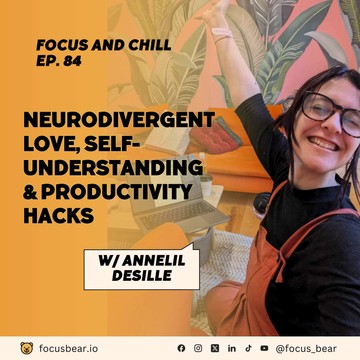
Feb 21, 2025 • 39min
Episode 84: Annelil Desille
Welcome to episode #84! We’re thrilled to be joined by Annelil Desille today.Annelil Desille is an ADHD-registered clinical psychologist who blends lived experience with evidence-based practice to support neurodivergent individuals. Her special interests include neurodivergence, the mind-body connection, sexual health, intimacy, attachment, and spirituality.Through her work, she helps neurodivergent individuals and couples navigate the unique challenges of relationships, task paralysis, self-acceptance, and personal growth. She also runs couples retreats focused on rebuilding intimacy and improving communication for neurodivergent partners.In this episode, we discuss ADHD, PDA (Pathological Demand Avoidance), neurodivergent relationships, and practical strategies for overcoming daily challenges.Welcome to the show, Annelil!QuestionsJN: When did you first realize you were neurodivergent?Identified with ADHD in 2018 during a binge-eating trial studyDiagnosed formally with autism in 2021 after a colleague recognized traits in herStruggled with self-doubt but eventually embraced her neurodivergenceJN: What were some of the biggest challenges you faced in school?Struggled with stats (had to take six years of it in her psych degree)Severe task initiation issues, leading to all-nighters and procrastinationExcelled in subjects she loved but found others nearly impossible to engage withJN: How did your diagnosis change your life?Medication was life-changing—marks jumped from 60s to 90sAllowed her to develop self-compassion for struggles she previously blamed herself forCreated affirmation decks to help herself and others embrace neurodivergenceJN: What challenges do you still experience now?Task paralysis due to PDA—struggles to start even things she enjoysUses the INCU acronym (Interest, Novelty, Competition, Urgency) to overcome task avoidanceFinds creativity and gamification essential for motivationJC: What are you currently working on?Couples Retreats – Helping neurodivergent couples rebuild intimacy and improve communicationTask Initiation App – Developing an app that provides customizable voice prompts to match energy levelsJC: What strategies work best for productivity?Water bottles & snack stations to avoid breaking hyperfocusBody doubling and external accountability to stay on trackGamification – Making boring tasks fun by turning them into challengesJC: What productivity strategies don’t work for you?Time blocking & Pomodoro method – Feels too rigid and disrupts deep focusStrict consistency – Prefers a continuity approach (changing up habits every two weeks to maintain novelty)JN: What does your morning routine look like?Low-spoon, medium-spoon, and high-spoon versions based on energy levelsJournaling, gratitude, and affirmations as key daily habitsPrefers buffer time before work (arrives an hour early for flexibility)JN: How do you manage sleep with ADHD?Struggles with sleep regulation and frequent vivid dreamsAntihistamines unexpectedly helped with sleep due to histamine-related sleep disturbancesWorks with her body’s natural rhythms rather than forcing early wake-upsJN: Where can people connect with you?Therapy Practice: https://www.neurokinnection.com.au/Retreats & Resources: https://www.nk-intimacy-alchemy.com.au/Instagram: https://www.instagram.com/neurokinnection/JC: Final words for the audience?"Figure out what you need before seeking external solutions.""You know yourself best—trust your instincts and adapt strategies to fit your brain."More from Focus Bear:Website: https://focusbear.ioLinkedIn: https://www.linkedin.com/company/focus-bear/Youtube: https://www.youtube.com/@focusbearappTwitter: https://twitter.com/focusbear1Instagram: https://www.instagram.com/focus_bear/Facebook: https://www.facebook.com/focusbearapp/Podcast: https://podcast.focusbear.ioTiktok: https://www.tiktok.com/@focusbearConnect with Jeremy:LinkedIn: https://linkedin.com/in/nageljeremyEmail: jeremy@focusbear.ioConnect with Joey:LinkedIn: https://www.linkedin.com/in/joeycorea/Newsletter: https://thepluckyjester.com/newsletter/
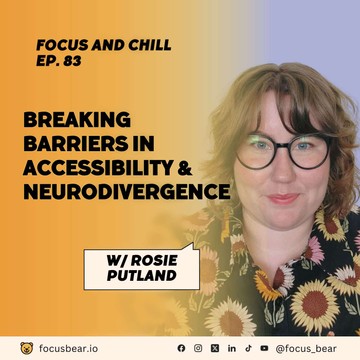
Feb 20, 2025 • 40min
Episode 83: Rosie Putland
Welcome to episode #83! We’re thrilled to be joined by Rosie Putland today.Rosie Putland is a proudly disabled and autistic public speaker, creative consultant, and co-founder of Modality Co, a digital accessibility consultancy focused on creating connection through accessibility. She is passionate about working with teams and leaders to develop sustainable, holistic digital accessibility practices.Rosie is known for her ability to create engaging presentations that change perspectives, her unwavering commitment to the accessibility and disability community, and her special interest in ducks.In this episode, we discuss Rosie’s journey of discovering she was autistic, her experience with autistic burnout, the importance of digital accessibility, and how organizations can create more inclusive online experiences.Welcome to the show, Rosie!QuestionsJN: When did you first realize you were neurodivergent?Always felt different growing up but attributed it to other factors (poverty, family violence, being queer)Noticed similarities with other neurodivergent people before having the language for itAt 16, found an online document on autistic traits and highlighted everything that appliedSelf-identified before formal diagnosis at 20 due to severe autistic burnoutJN: What was your experience with autistic burnout?Felt deep apathy toward everything, including special interestsStruggled with severe insomnia and inability to care for herselfHad difficulty navigating support systems like CentrelinkTook six to eight months to recover from burnout and start rebuildingJN: How did formal diagnosis change things for you?Brought relief and validation after years of feeling misunderstoodRequired recontextualizing her entire life through an autistic lensHelped her shift from internalized shame to self-acceptanceAllowed her to create accommodations that support her well-beingJN: What challenges do you still face today?Neurodivergence intersects with other health conditions (e.g., rheumatoid arthritis, cancer treatment)Lack of resources on navigating major health challenges as an autistic personDifficulty finding information or medical professionals who understand both autism and chronic illnessJN: How do you approach disclosure of neurodivergence?Faces discrimination whether she discloses or not, but prefers to control her own narrativeChooses to disclose because it helps others understand rather than make incorrect assumptionsAdvocates for meeting people where they are in their neurodivergence journeyJC: What strengths are you leaning into now in your work at Modality Co?Intuition & Pattern Recognition – Quickly identifies problems and potential risksStrong Sense of Justice – Drives her advocacy and push for meaningful changeAbility to Learn Quickly – Picks up new skills and adapts to different challenges, which helps in entrepreneurshipJC: Can you tell us about your work at Modality Co and the Tasmanian Digital Accessibility Community?Modality Co: Helps businesses create accessible digital products and servicesWorks with companies to meet Web Content Accessibility Guidelines (WCAG)Runs training and consulting programs to improve digital accessibilityTasmanian Digital Accessibility Community: Monthly meetups fostering the accessibility and disability communityJC: What do you enjoy doing in your free time?Loves spending time near reserves to watch ducks (but doesn’t have pet ducks yet!)Reads nonfiction and sci-fi, especially books by disabled authorsEnjoys knitting, sewing, gardening, and interior designJC: How do you optimize productivity during your working hours?Finds co-working/body doubling extremely effective for staying focusedUses Twitch co-working streams when working aloneUses five-minute timers to trick her brain into getting startedJC: What productivity advice doesn’t work for you?"Eat the frog" (doing the hardest task first) creates anxiety and resistanceShort work bursts & frequent breaks disrupt flow; prefers long focus sessionsJN: What does your morning routine look like?Prefers to be the first one awake for quiet timeEnjoys breakfast and coffee alone while listening to an audiobook or podcastStarts work before business hours to get deep work done without distractionsJN: How do you wind down at night?Follows a strict sleep routine to prevent insomniaHas mandatory low sensory hours from 8-10 PM for relaxationUses a Manta sleep mask with Bluetooth for audiobooks or meditationJN: Where can people connect with you?LinkedIn: https://www.linkedin.com/in/rosie-putland/Website: https://modalityco.com/Meetup: https://www.meetup.com/en-AU/tasmanian-accessibility-community/JC: Final words for the audience?"Meet people where they are in their neurodivergence journey.""Community is the most powerful tool you can have."More from Focus Bear:Website: https://focusbear.ioLinkedIn: https://www.linkedin.com/company/focus-bear/Youtube: https://www.youtube.com/@focusbearappTwitter: https://twitter.com/focusbear1Instagram: https://www.instagram.com/focus_bear/Facebook: https://www.facebook.com/focusbearapp/Podcast: https://podcast.focusbear.ioTiktok: https://www.tiktok.com/@focusbearConnect with Jeremy:LinkedIn: https://linkedin.com/in/nageljeremyEmail: jeremy@focusbear.ioConnect with Joey:LinkedIn: https://www.linkedin.com/in/joeycorea/Newsletter: https://thepluckyjester.com/newsletter/
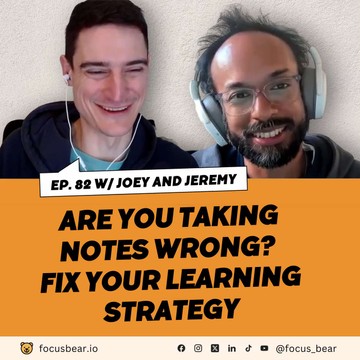
Feb 18, 2025 • 27min
Episode 82: Joey and Jeremy
Welcome to episode #82! Today, it’s just Joey and Jeremy discussing how to manage learning and memory.With so much information available, how do you decide what’s worth remembering? Joey and Jeremy dive into note-taking strategies, the balance between deep learning and quick recall, and whether it’s worth building personal knowledge systems when AI tools like ChatGPT exist.They explore different ways to process new information, from mind maps and Anki flashcards to slipboxes and structured review systems. Should you write everything down, or does the best knowledge naturally stick?Join them for a deep dive into learning, retention, and making information work for you.Topics Covered in This Episode:How to decide what’s worth rememberingThe pros and cons of note-takingAnki vs. slipbox: Which system works best?The role of AI in learning and memoryHow to balance structure with natural recallThe importance of interleaving different subjectsHow humor and personal connections improve memoryMore from Focus Bear:Website: https://focusbear.ioLinkedIn: https://www.linkedin.com/company/focus-bear/Youtube: https://www.youtube.com/@focusbearappTwitter: https://twitter.com/focusbear1Instagram: https://www.instagram.com/focus_bear/Facebook: https://www.facebook.com/focusbearapp/Podcast: https://podcast.focusbear.ioTiktok: https://www.tiktok.com/@focusbearConnect with Jeremy:LinkedIn: https://linkedin.com/in/nageljeremyEmail: jeremy@focusbear.ioConnect with Joey:LinkedIn: https://www.linkedin.com/in/joeycorea/Newsletter: https://thepluckyjester.com/newsletter/


